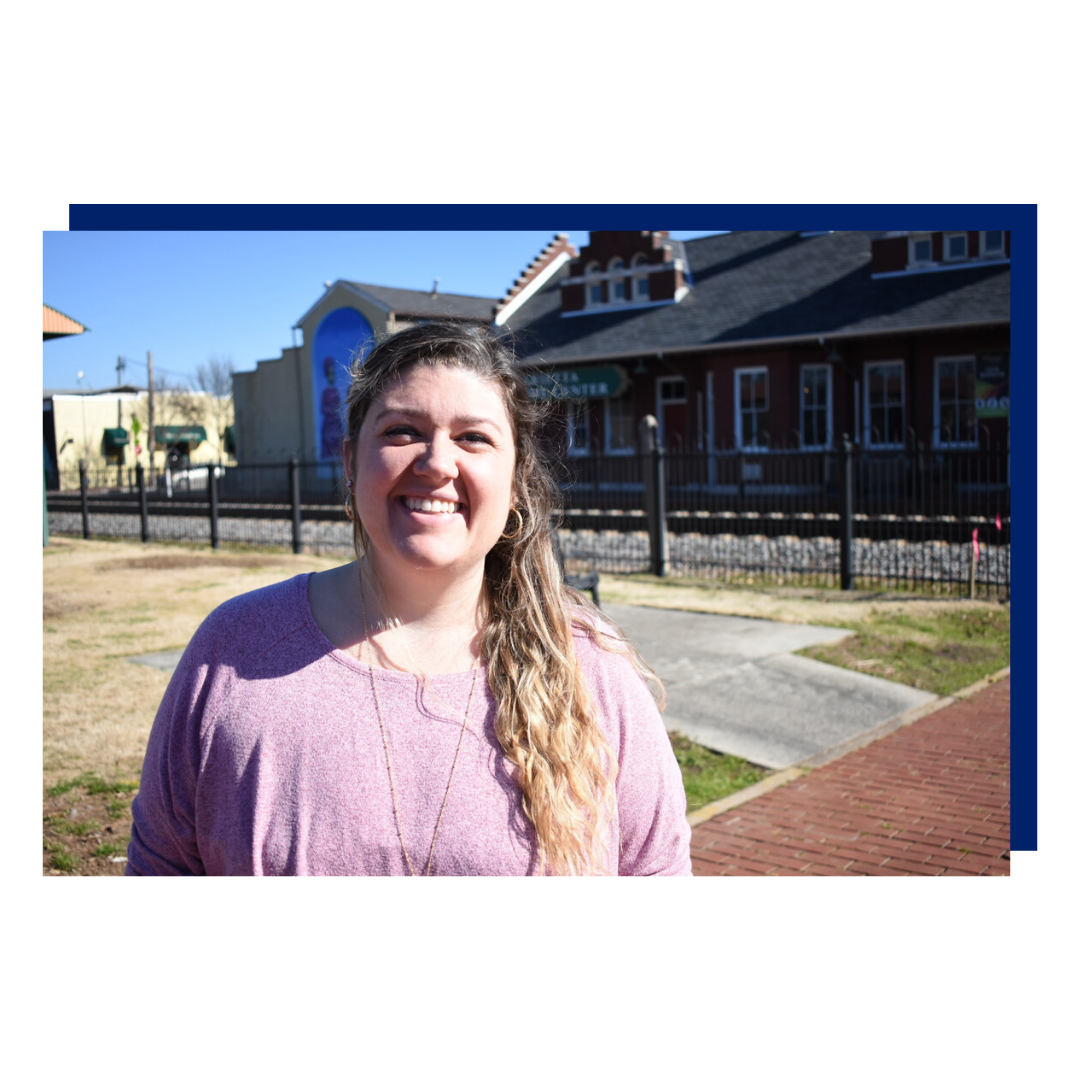The Resilience of a Domestic Violence Survivor

Today we want to tell you a story of resilience. K came to us after experiencing domestic violence in her relationship. And although she had been told that receiving protection was unlikely without substantial evidence, she chose to go to court and seek justice anyways. With the help of Legal Aid, she received legal protection against her abuser, and the protective order has been successful at stopping the contact. Today, K is on her way to becoming a paramedic, and she’s eager to help others who are suffering in similar circumstances. Here is our interview with K, where she opened up about her life and her experience as a survivor of domestic violence.
Tell us a little bit about who you are and how you’d describe yourself
K: I am 29 years old. I’m originally from Florida and I’ve been here for about 14 years. I love Georgia and I can’t wait to get back to Florida one day though. I am an EMT, soon to be a paramedic. I just went through school and I’ve got one more test to go. I have a boyfriend who is a crane operator. Life is good. Life is wonderful.
As an EMT, what’s an average day on the job look like for you?
K: It depends on what I’m doing, 911 or transport. I didn’t know before I got into this job that there are actually a lot of people who are still sick when they leave the hospital and need an ambulance to take them home. So some days I do that, where I might take someone to a rehab kind of place or take them home. We have some sad stories of hospice patients, and that’s always heart-wrenching. It really gets me when people don’t have family with them and have to do all of that on their own. I can’t imagine not having my family with me, because my family is so close knit. But then we also have the good stories where I’m on 911 and we save someone’s life, and it’s amazing. It’s the best high you could ever have. I always feel like I’ve got a privilege that not a lot of people get to experience, where I get to see a different side of humanity that is amazing. People are good. You hear a lot of bad stories about people, but it’s not how the whole world is.
That’s interesting to me, because it sounds like a very heavy job.
K: It is, it is. You have your sad things like suicides, or someone’s family member tragically dying in a car accident, or anything that — nobody wants to lose a loved one. But I’m such a positive person that I try to look on the bright side of the times that we do get to save someone, or we get to make a positive impact. We’ve got a lot of people who get transported to mental health facilities, and especially if they’re young teenage girls — it’s such a hard time in someone’s life — and if I can give them a couple words of wisdom, maybe it will stick.
What got you into this field of work?
K: I’ve always wanted to be a nurse and so, at the time, before I was into EMS, I knew I needed to do something in the hospital field. And my best friend is an EMT and she’s about to be a paramedic as well, and so she’s like, you should try this out. So I gave it a try, jumped right in, and absolutely fell in love with it.
What would you say matters most to you on a daily basis?
KD: I would say being kind. Being kind to people is super important. You never know what someone is going through. You never know somebody else’s story, and I think everyone has something going on in their lives at one point or another, and why make that harder for someone else?
What’s something in your life that you’re most proud of?
K: I think becoming a paramedic is my proud moment. And then I have to say dealing with everything that I have been with my TPO (temporary protective order) and my ex, I think getting out of that situation, standing up for myself, and not just saying, oh it’ll get better, or this is okay. Because it’s not okay. So I think that that is also something I’m most proud of, that I got myself out of that situation. Because there’s a lot of women and men who don’t, who just stay.
I think everyone probably knows someone who has been affected by domestic violence. Do you have any advice for someone suffering from the same experience?
K: As far as the domestic violence side and the relationship side, get out because it’s not going to get better; it’s going to get worse. You think it’s going to get better, and when you’re in the situation you’re not seeing things clearly and you’re not thinking clearly. When you’re on the outside, you can really reflect and see that it’s not okay; it’s not going to get better. As far as the legal side of it, when I first got to the TPO office, they said, “You’re probably not going to get this. The judge probably isn’t going to grant this. There’s not enough evidence.” And I said, well we’re going to go try. The worse they can say is no. And thank God I did, because the judge took one look at it and said “Granted.” But people were doubting. I would say just try and keep trying, because what do you have to lose?
SC: Was there anything for you that helped cut through all of the doubt and confusion about the situation?
KD: I think when he started actually getting violent I was like okay, this is serious. Beforehand with the mental and emotional abuse, I felt like, “I’ve made my choice to live with this person. I’ve gone through all these obstacles to get to where I am, and now I’m going to live with it” kind of thing. That was my mindset, where I was like, this is just how it’s going to be. And then when it got physical, I realized, no. It kind of woke me up a little bit.
I did a lot of research on it leading up to the break-up, and that kind of helped too, to understand a narcissistic relationship. And there was a lot of what they call “trauma bonding” where you both fight and then you come back together and you think you’re stronger than ever, and then another fight happens, and it’s just a vicious cycle. It was just getting to a point where the fighting was non-stop, and the name-calling.
My mindset was, “I must be doing something wrong because it takes two people, so what am I not doing right?” I was made to feel like I wasn’t good enough, and I was walking on eggshells, and those were the warning signs up to where it got physical. And I just chose to ignore them. But like I said, it’s really hard when you’re in that situation and you’re just blinded to what’s going on.
Before reaching out to Legal Aid, did you try to navigate the legal system on your own?
K: No. So that night after he had pushed me, we had gotten a police report and a police officer showed up, who was so nice. You know, I said, “This is really weird for me. Normally I’m on the other side of things [as an EMT], and I see women who have been involved in domestic violence”. So it was really strange for me to be in that situation. And he was so helpful and he said his suggestion was to go get a TPO the next day, so that’s what I did. Thankfully he suggested that, because I was so frazzled, I just didn’t know what to do next.
I appreciate you speaking openly about this. I think it’s really brave, and I think for a shift to happen in the culture, we have to be able to speak about these things.
K: Definitely! Like at work if I can give one piece of advice, or I can tell my story one time to somebody, maybe something sticks for someone. That’s the good that comes out of it.
So when times are tough, what pulls you through?
K: One of my favorite quotes is “An arrow can only be shot forward by pulling it backwards”, so when something in life is dragging you backwards and giving you obstacles and problems, just know that you’re being launched into something great. So you just have to stay focused. It’s so cliche to say that the good times are what get you through the bad times, because there’s always going to be another good time. But it’s so true.
I used to think the world was very black and white, and it was either one way or another, kind of thing. And it’s through growing up — and I think your 20s are such a big time of growth for people — that I’ve realized there are a lot of shades of grey. It doesn’t have to be black and white.
What’s one piece of advice that has stuck with you?
K: My mom told me this when I was in high school, and this is the one piece of advice that I share with all of my teenage suicidal patients that we’re transporting, and that is: Your life is going to be completely different six months from now. It will be completely different, so just keep going and it’ll get better. Your life is not going to stay exactly how it is now, so if you keep focused, and you keep aiming towards that, then it’s going to happen for you.
This month, we’re raising money to help more survivors of domestic violence. Did you know that women aren’t guaranteed lawyers in domestic violence situations? That means that victims either have to go it alone, or have to find funds to hire a lawyer themselves. This can be an impossible task since financial manipulation goes hand in hand with domestic abuse.
That’s why we need you. Studies show that lawyers are the best way to prevent future violence. You can help get free lawyers to women living in poverty, by making a donation to Legal Aid this #GivingTuesday. Your dollars have a direct impact on survivors, and more people like K will be able to get help. With your help, victims can leave abusive situations and keep their children safe. You can make a gift at: give.atlantalegalaid.org/givingtuesday
